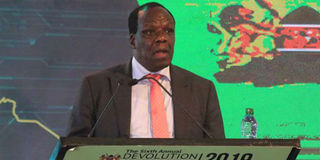Uhuru and governors must bite the bullet and trim growing wage bill

Council of Governors Chairperson Wycliffe Oparanya gives his remarks during the sixth devolution conference at Kirinyaga University on March 5, 2019. County governments are the largest employers in their respective regions. PHOTO | FILE | NATION MEDIA GROUP
What you need to know:
- Millions of people raise the taxes to enable the national and county governments to render services to them. But their money does not work for them.
- President Kenyatta, governors and the private sector may want to observe that governments can save a lot of money by eliminating wastage.
The most stunning story to have come out of the recently concluded Council of Governors conference was told by President Uhuru Kenyatta.
It was neither about his furious arch enemy turned brother Raila Odinga, nor deep-in-goop Deputy President William Ruto.
According to the President, 52 percent of the national government’s revenue goes to pay salaries, 32 percent is used for recurrent expenditure and the remainder on development and provision of services.
As he told it, there is a county government which spends Sh6 billion of its Sh9 billion revenue on paying its 6,000 civil servants. That leaves just Sh3 billion to be used to render services and development for its two million plus residents.
WASTAGE
Another county uses Sh600 million to oversee work that is worth Sh800 million. Needless to say, the county's ordinary people do not get a slice of the Sh600 million. Instead, it goes to the elite of the oversight team.
This is the scandal: the misuse, abuse, wastage and downright theft of the public purse of, by and for the few at the expense of the many.
Millions of people raise the taxes to enable the national and county governments to render services to them. But their money does not work for them.
The majority of the people work hard and long, early and late, in season and out of it, to pay taxes that work for the few.
The money by many, and for the many, works for the few. Unfortunately, we have been here before, twice in fact.
WAGE BILL
In April 2013, a freshly installed President Kenyatta warned that a public wage bill that gobbled up 40 percent of government revenue was unsustainable.
So, if in 2019 the wage bill has hit 52 percent of revenue, then the time to hit the reset button is overdue.
In 2014, the President revisited the matter of the ballooning public wage bill vis-a-vis the public purse.
He even ordered members of his Cabinet, civil service top dogs and parastatal fat cats, to take a 20 percent pay cut.
In 2013, the President asked heads of department to work together to bring down the wage bill. Nothing has worked or changed.
Then, conceding that most of the public purse was being used by the national and county governments to the advantage of the few, and disadvantage of the many, the President suggested that he and the Council of Governors work together to convoke a national conference.
SOLUTION
To this indaba, Mr Kenyatta said, all sectors would be invited to deliberate and find solutions on the use of government revenue for the many and not the few.
I doubt the President is serious about a national conference, much less the complexion of it.
I remember the President in 2014 opening a national dialogue conference headlined by the Salaries and Remuneration Commission whose agenda was the runaway public wage bill.
If the President is serious about reducing the public wage bill, then he needs to first trim the bloated public service.
Before making such a move the President knows he will need Parliament and most politicians on board.
The national government is the largest employer in Kenya and county governments are the largest employers in their respective regions.
Ruthless, profit-driven private sector executives would have no qualms whatsoever about recommending downsizing of their employees.
VOTES
But vote-driven and vote-seeking politicos will loathe losing the votes of those who lost jobs.
And still governments — national or county — will worry about raising money for the send-off handshakes for the retrenched and the retired.
Put another way, if the President's 20 percent pay cut order did not work; if his call to government apparatchiks to bring down the public wage bill did not fly; and if the Sarah Serem-led national dialogue conference flunked, a governors-led national conference may meet a similar fate.
But as they consider a national caucus on salaries and numbers of civil servants, President Kenyatta, governors and the private sector who will be invited, may want to observe that governments can save a lot of money by eliminating wastage.
You don't lose votes by eliminating wastage; and you don't need a national conference to devise a wastage eliminating strategy. You need policy and enforcement of it.





